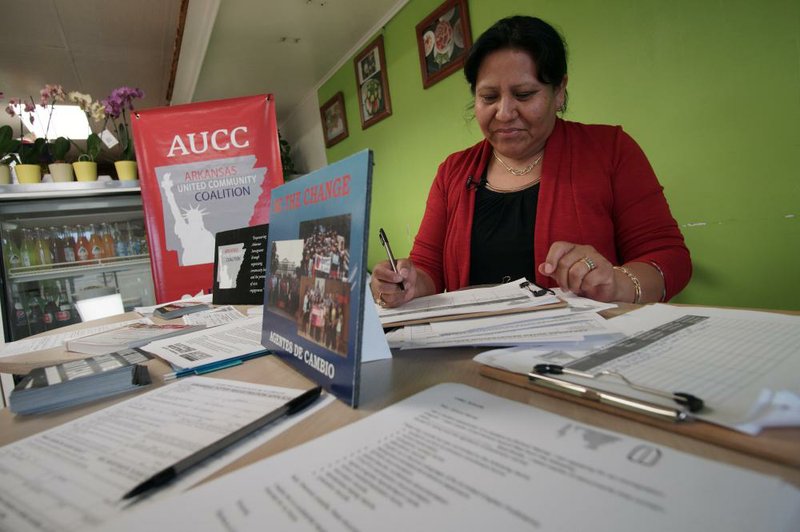As the U.S. presidential race thrusts immigration issues to the forefront, statewide organizers are trying to transform the attention into greater political engagement among the state's growing Hispanic population.
Those efforts are unlikely to change Arkansas' presidential vote in 2016, but they could establish a framework in which the growing population of nearly 200,000 Arkansans of Hispanic descent have greater statewide political influence in the future, said Terry Trevino-Richard, state director for the League of United Latin American Citizens.
In the meantime, Hispanics could more easily tap into voting power in places where they are concentrated, such as Northwest Arkansas, southwest Little Rock and the Sevier County town of De Queen, where Hispanics constitute the majority, said Mireya Reith, executive director of the Arkansas United Community Coalition.
"We have found this year, more than any previous year, lines of people coming to us," said Reith, whose group has helped the state's Hispanic population navigate voter registration since 2012.
Arkansas' Hispanic population has continued to grow since booming in the 1990s, according to census data. Yet, Hispanics remain mostly unrepresented in local and statewide elected offices, organizers said, and other ethnicities will likely outvote Hispanics by a 20-to-1 statewide margin this year.
Ongoing efforts to change that include helping 40,000 or so immigrants with permanent-resident status in Arkansas to become U.S. citizens, so they may vote this cycle or in future elections.
The immediate goal is to sign up 2,000 Hispanics to vote this year and turn out 50,000 of the state's 60,000-80,000 eligible Hispanic voters.
Efforts include encouraging Hispanics to run for office.
"As we see more Latinos graduate from schools and professional schools, there's no doubt we will see more judges, mayors, city councilmen," Trevino-Richard said. "It will probably occur at the local level [first]."
Viviana Torres, 32, who has never voted, registered Thursday during a southwest Little Rock event. Torres learned of the registration drive from a radio ad and said she intends to cast a ballot against Republican nominee Donald Trump because of the language he has used when discussing undocumented immigrants in the United States.
For signing up to vote, Torres received a free cup of ice cream from Neveria Tino, a Baseline Road store of fruit arrangements and ice cream near the center of Little Rock's largest Hispanic population.
Torres left her registration form with organizer Letecia Reta.
"You have to raise your voice so you can change things," said Reta who, as a nonpartisan, has helped about 50 people sign up this year.
Tino Guevara's store covered the cost of at least 12 ice-cream cups, or the number of people who registered there Thursday in what the Arkansas United Community Coalition billed as the launch of its 2016 statewide campaign.
The Springdale-based, immigrants-rights coalition will have "daily events going on across the state of Arkansas," Reith said.
Get-out-the-vote events won't wait for the November general election but start instead Sept. 20, when school boards can begin holding elections, Reith said.
Nationally, at least two of every three Hispanics have voted Democrat in the past two presidential cycles, according to Pew Research Center data. The nonpartisan research agency in July reported that Democratic nominee Hillary Clinton held a 66 percent to 24 percent lead over Trump in its survey of registered Hispanic voters.
About 198,000 Hispanics live in Arkansas, up from 19,600 in 1990 and 86,900 in 2000, according to census data.
Of that population, about 60,000 are eligible -- but not necessarily registered -- to vote, according to the Pew Research Center. Reith said she believes the voter-eligible number is closer to 80,000.
While the potential Hispanic voting power has grown nationally since 2012, the growth here has been more tepid, according to Pew. Hispanics make up 17.3 percent of the U.S. eligible voter total, up from 16.4 percent in 2012. The share in Arkansas is 2.7 percent, up 0.3 percentage points from 2012, according to Pew.
"[Latin Americans] are not going to have a dramatic effect on the election here in Arkansas, with the exception of Northwest Arkansas because of the sheer numbers they have there," Trevino-Richard said.
If 50,000 Hispanic voters in Arkansas turn out in November, as is the coalition's goal, they would comprise less than 5 percent of the electorate -- that is, if the rest of the state votes at the same volume as 2012.
Nonetheless, Reith pointed to a "trajectory of rapid change." An additional 20,000 Hispanic residents will turn the voting age of 18 by 2020, she said.
"We know where the potential for growth is," Reith said.
The voter registration deadline is Oct. 10.
State Desk on 09/05/2016

